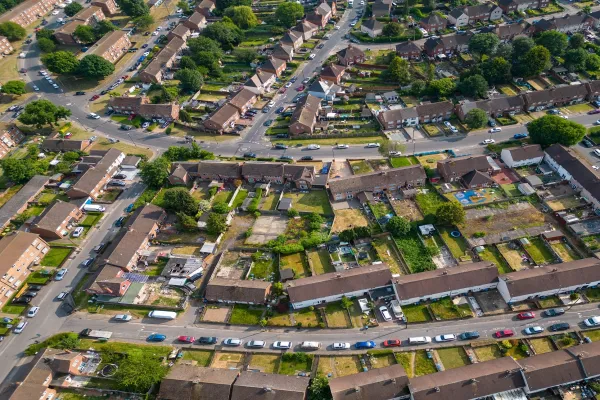Selling a house involves more than just handing over keys and signing papers. Many make the mistake of presuming that selling is only about what you can gain. However, there are actually many costs, some of which are often hidden depending on how you choose to sell your house.
In this guide, we’ll explore the true cost of selling a house. We’ll look at everything from hidden fees and costs and also ways to get your house sold as cheaply as possible.
Let’s get started.
The average cost of selling a house in the UK
According to Barclays, the estimated average cost of moving house in the UK is £8,885. This is an unsightly figure when you consider the money you may have spent renovating your house to sell and potentially purchasing a new property.
Selling fees
The costs of selling are split over different parts of the selling process. Here’s a breakdown of some of the selling fees you can expect:
Estate agent fees
Traditional estate agents play an important role in the house-selling process, offering their expertise to market your property and find potential buyers. However, their services come at a cost, typically calculated as a percentage of the property’s sale price. On average, an estate agent will charge around 1.42%, including VAT. However, the fees can range from different estate agents.
What factors affect estate agent fees?
- Location
Estate agents may charge different fees based on the location of your property and the demand in the local housing market.
- Their reputation and services
Established and reputable agents might charge higher fees, but they will usually provide a comprehensive range of services that will help you from start to finish. In essence, you pay for their brand and reputation.
Online estate agent fees
Online real estate agents are a new approach that has introduced a different fee structure to the property-selling space. Instead of a percentage of the sale price, online agents usually charge a fixed fee. This approach can be more cost-effective for sellers. Online agents commonly require an upfront payment for their services, making the cost more transparent from the beginning. The flat fees for an online estate agent typically range from between £300 and £1,500.
Will you save with an online agent?
The question of whether you’ll save money with an online estate agent can depend on many factors. If you live in an area where property is always in demand, then an online agent is definitely the way forward. Whereas if you live somewhere rural, then an estate agent with a network of buyers would be more suitable. However, even in the latter situation, if you’re not in need of an urgent sale, then listing with an online agent can still work in your favour.
Conveyancing fees
Conveyancing is another important part of the property-selling process, which also comes at a cost.
What do conveyancing fees cover?
Conveyancing fees cover a range of legal services performed by solicitors or licensed conveyancers. Here’s a breakdown of what these fees typically include:
- Property checks and searches
Solicitors carry out essential checks and searches to ensure there are no legal issues affecting the property, such as outstanding debts or planning restrictions.
- Drafting and reviewing contracts
The legal professionals involved draft and review contracts outlining the terms and conditions of the property sale. This includes making sure that you’re represented properly during negotiations.
- Liaising with the buyer’s solicitor
Regular and thorough communication is needed between solicitors to address any legal queries or concerns raised by the buyer’s side. Issues can crop up at any time, which can threaten to delay the selling timeframe if not appropriately managed.
- Handling the transfer of funds
Conveyancers manage the transfer of funds between the buyer and seller, ensuring a secure and legal transaction.
Understanding conveyancing costs
Conveyancing fees can vary based on factors such as the complexity of the transaction, the value of the property, and the choice between using a solicitor or a licensed conveyancer.
Solicitor vs. Licensed Conveyancer
Solicitors are qualified lawyers who can handle a broader range of legal matters, while licensed conveyancers specialise specifically in property transactions.
While solicitors may offer a wider range of legal services, licensed conveyancers provide the more cost-effective option for straightforward property sales.
Additional costs
In addition to the basic conveyancing fees, there may be additional costs which can be added to conveyance fees. Examples of this can include charges for searches and land registry fees. These additional costs can add up to £700 to the total conveyancing fee.
The average cost of a conveyancer
The average cost of conveyancing fees is between £610 and £950. However, you can find some conveyancers who offer a ‘no sale, no fee’ service. With a service like this, you’ll usually pay around £160 to £300 initially. Once it is completed, you’ll pay the rest of the fees required.
Mortgage Fees
When you sell a property that is currently mortgaged, there may be additional fees related to the mortgage that must be included in the total cost of selling. There are two main fees to be aware of early repayment charges and exit fees.
Early Repayment Charge
If you have an existing mortgage on the property you’re selling, you may find that you have to pay an early repayment charge. This fee is set by lenders when a borrower settles their mortgage before the agreed-upon term. Lenders provide mortgages with the intention of making money in the form of interest throughout the mortgage term. So, if you end the agreement early, they’ll use early repayment charges to get some of the interest income that they would have received over the remaining term of the mortgage.
Early repayment charges are not the same across all mortgage agreements. Some lenders may charge a percentage of the outstanding mortgage balance, while others use a tiered structure based on the remaining term.
For example, on a percentage-based agreement, the percentage typically falls within the range of 1% to 5%. On the other hand, in a tiered structure, the percentage changes based on the year. For instance, if you opt for a 5-year fixed-rate deal, the early repayment charge might be 5% if you exit within the initial year, 4% in the second year, 3% in the third year, and so forth. The structure ensures that the fee reduces as you progress further into the term of your mortgage deal.
Certain circumstances, such as selling the property due to a change in personal circumstances like divorce or job relocation, may exempt you from early repayment charges. However, you should check your mortgage agreement for details.
Exit Fee
An exit fee is another cost associated with selling a property with an existing mortgage. This fee is charged when you fully repay your mortgage and close the mortgage account.
Exit fees can vary, and some lenders may not charge an exit fee at all. They are usually more common with certain types of mortgages, such as fixed-rate mortgages. However, variable-rate mortgages may have lower or no exit fees.
Additionally, some lenders require you to notify them in advance if you plan to repay the mortgage early. Failing to do so could result in additional charges.
EPC Assessments
If you bought your property within the last ten years, you may already have a valid Energy Performance Certificate. However, if you don’t, then before your property hits the market, you’ll need to get this sorted, as every home in the UK is required to have one. This certificate evaluates your home’s energy efficiency and environmental impact, providing potential buyers with important information.
Arranging an EPC involves hiring a qualified assessor who will conduct an inspection and issue the certificate. The rating not only satisfies legal requirements but also enhances your property’s appeal. A higher efficiency rating can positively influence a buyer’s decision, making your home a more attractive prospect. Before you can sell, you need to have at least made an application for an EPC. Prices for testers range between £50 and £120, so it is worth shopping around.
Removal and cleaning costs
These costs are often underestimated, but they are an additional cost of selling. If you’re selling a home, you will typically need to empty it out and then carry out a deep clean before the buyer can move in. This will definitely be the case if you use an estate agent, as they will expect to have a thoroughly clean and empty home to hand over. It can save you a lot of time and stress to hire a professional cleaner to go over your property thoroughly once you have moved out.
Additionally, when it comes time to move your belongings out, having a removal company in place to help will save you a lot of hassle. However, if you don’t have a lot of stuff, a man-with-a-van or hiring your own vehicle may be appropriate. The cost will inevitably vary depending on how hands-on you intend and whether you need help packing or storage.
Capital Gains Tax
When you finally manage to sell your property, you will also have to account for tax, specifically Capital Gains Tax. This is a tax on the profit made when you sell an asset that has increased in value. In the context of selling a property, the “gain” is the difference between the property’s purchase price and the selling price.
What you need to know about Capital Gains Tax.
Principal Private Residence Relief):
If you’ve lived in the property you’re selling as your main residence, you may be eligible for Principal Private Residence Relief. This relief can exempt you from paying Capital Gains Tax on the portion of the property used as your main home.
Letting Relief
If you’ve let out part of your property, you may be eligible for Letting relief, which can further reduce your Capital Gains Tax liability.
Annual Exemption
Each individual has an annual CGT exemption allowance. Gains up to this allowance are tax-free. You may be able to use this current annual exemption limit to reduce the amount owed.
Property Improvements
Costs incurred for improving the property, such as extensions or renovations, can be deducted from the overall gain, potentially reducing the liability owed.
Why choose Sold.co.uk
As you may have noticed, there are many costs associated with selling a property. These costs don’t take into account the amount of time needed to achieve a sale either.
However, with Sold.co.uk, we aim to simplify the entire process of selling a house.
We ensure that there are:
- No hidden or unnecessary fees
- No unexpected delays or time wasted
- Most importantly, a fast and efficient process according to your timeline
We do this by offering two fully managed avenues to sell your property.
If you’re in a rush, we’ll use our own funds and act as a cash house house buyer. Or, if you have time, we’ll act as an online real estate agent and get your property in front of qualified buyers.
So if you need to sell a house fast, get in touch through our enquiry form.
FAQ
What are the legal costs to sell a house?
Legal costs are an expected part of the selling process. The costs come from enlisting the help of solicitors or licensed conveyancers. They handle the legalities of conveyancing, property checks, and drafting contracts. Solicitors or licensed conveyancers handle these legalities, ensuring a smooth and legally compliant transaction. The average costs for this can vary from £610 to £950 plus an extra £700 for any additional services required.
Do you pay Stamp Duty when selling a house in the UK?
Stamp Duty Land Tax is only associated with property purchases, not sales. It is always the buyer who pays for this. However, if you’re selling your main residence and buying a new one, then you will need to pay this when you purchase the new property.
What is the best price for selling a house?
The best price for selling a house depends on many different factors. This includes factors such as the property’s location, size, condition, and current market trends. The best way to find the best price is through conducting a property valuation. You can get one for free through our website.
Can I sell my house without an estate agent?
Yes, it is possible to sell your house without an estate agent. You can choose to list the property yourself. While it can save on estate agent fees, there is a lot of time, knowledge, and effort required to achieve it successfully. However, you can also sell directly to a cash house buyer like us at Sold.co.uk. With us, there are no estate agents’ fees and no other hidden fees or charges to worry about.
















